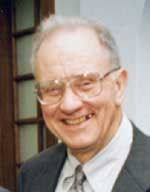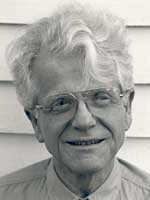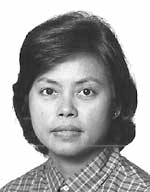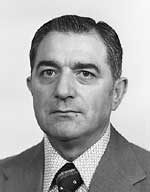Russell Bidlack
Friends and colleagues of the late Russell Bidlack are invited to a memorial service at
4 p.m. June 22 in the Michigan Union Pendleton Room.

Bidlack left his mark at U-M in academic circles, but also on those who knew him throughout his life. The dean emeritus of the School of Information (SI) died Sept. 18, 2003, of pancreatic cancer at his Ann Arbor home, surrounded by family and friends. He was 83.
Bidlack, who served as dean from 1969 until his retirement in 1985, was highly regarded for his dry wit, as well as his kindness toward all and his dedication to the University, where he earned a bachelor’s degree, two master’s degrees and a doctorate.
“SI has been influenced immensely by his leadership,” says C. Olivia Frost, associate dean for professional programs. “It is thanks to Russell Bidlack that SI is a self-standing school within the University and has been able to grow and attain a leadership role over the years in a way that would have been unimaginable had we remained a department within the College of Literature, Science, and the Arts.”
As dean, Bidlack helped launch a number of diversity initiatives in library education that have had long-term impact on bringing under-represented minorities into the library profession. “As educator and dean,” Frost says, “Bidlack cared deeply about the students of the school. And while the school changed greatly in the years following his deanship, he was able to appreciate the course of the school’s new direction through the accomplishments of its students, and he enjoyed contributing to the school through scholarship support.”
David Hessler, professor emeritus, knew Bidlack for nearly 40 years. “I was fortunate to know Russ Bidlack since he tried to teach me cataloging in 1965, and I had the joy to serve under his deanship until he retired,” he says. “He was truly loved by all who knew him well. Russell Bidlack was the most ethical and genuine human being I ever met. Russell was honest, humble, dedicated and a true scholar. Above all, Russell cared about quality teaching, and nothing gave him more joy than the success of our graduates.”
Francis X. Blouin, professor at SI and director of the Bentley Historical Library, knew Bidlack well. “Back in the late ’70s, in tight economic times, there was an effort to selectively cut programs on the campus. Russell vigorously defended the school to the point where it was spared the worst,” he recalls. “Without that effort, the foundations for modern SI would not have been in place.”
Bidlack was born May 25, 1920, in Manilla, Iowa. He was a self-described farm boy until he left home for Simpson College, where he earned his first bachelor’s degree, in English. His life-long academic career in history, library science and library education began officially in 1951 when he received his first appointment as an instructor at U-M.
In 1942 he married Melva Sparks, and they were together more than 50 years until her death in 1993. They raised four children: Stanley, Martha, Christopher and Harold.
In retirement, Bidlack researched, wrote and lectured about Ann Arbor’s early history.
Thomas Winner
Thomas Winner, who was a professor of Slavic languages and literatures at U-M, Duke University and Brown University, died April 20.

Winner was born in Prague on May 4, 1917. He left Czechoslovakia in 1939 after winning one of 20 fellowships raised by Harvard students to help students escape from Nazi-occupied Europe to study at Harvard. He sailed for New York the day after Germany invaded Poland at the start of World War II. Winner earned his bachelor’s degree from Harvard in 1942 and his master’s in 1943, both in Slavic literature.
He met his wife, Irene Portis, at Harvard in spring 1942, and they were married later that year. They went in 1943 to Washington, D.C., where he worked in the propaganda unit of the Office of War Information. In 1947, he went to Columbia University, where he earned a doctorate in 1950 in Slavic literature.
Winner—who spoke 20 languages—was a professor in the Slavic literature departments of Duke (1948-58), U-M (1958-66) and Brown University (1966-82). While at Brown, he began a close collaboration with Roman Jakobson, who then was at Harvard, and he organized and directed the Center for Research in Semiotics at Brown, the first such center in the United States. Winner was granted an honorary degree from Masaryk University (1995) and was awarded the Josef Dobrovsky Medal of the Academy of Sciences of the Czech Republic (1997) and the Jubilee Medal of Charles University (1998).
Winner held many visiting professorships, including two through the Fulbright program. He was the author or editor of 12 books and at least 130 articles in learned journals, as well as many reviews of scholarly books. In 1958 he published “The Oral Art and Literature of the Kazakhs of Russian Central Asia” (Duke University Press). In 1966 he published “Chekhov and His Prose” (Holt, Rinehart and Winston).
At U-M he initiated a publication series dedicated to the semiotic works of the Moscow-Tartu school. At Brown he edited the Brown University Slavic Reprints. In the last years of his life, he was working on a book on Czech avant-garde literature between World Wars I and II.
Winner’s writings brought to light the writings of the Prague linguistic circle—a group that had been organized before World War II by the linguist Roman Jakobson, but which later was suppressed during the years of German occupation and post-war Communist rule. Winner also introduced the Moscow-Tartu school to the West, forever changing semiotic studies.
He is survived by his wife of 62 years, Irene Portis-Winner; two daughters, Ellen Winner of Cambridge, Mass. (a professor at Boston College), and Lucy Winner of Brooklyn, N.Y. (a professor at Empire State College); and two grandchildren, Benjamin Winner Gardner and Kyla Winner-Connor.
—Submitted by the Winner family
Milagros Simmons
Milagros Simmons, associate professor in the Department of Environmental Health Sciences (EHS) at the School of Public Health (SPH), died May 11. She was 64.

Simmons was a respected teacher and researcher in environmental chemistry who spent three decades at the University. She was instrumental in the development and sustenance of excellence in teaching and research in environmental chemistry and health in the department. Her work on the International Joint Commission on the Great Lakes influenced the direction of research on these bodies of water.
Simmons received her baccalaureate in chemistry at the University of Santo Tomas (Manila) in the Philippines in 1959, and her master of science in analytical chemistry at Wayne State University (WSU) in 1962. In 1966 she received her doctorate in organic analytical chemistry, also from WSU.
After an early career in industry in the Philippines, she worked as an assistant professor in the department of chemistry at Mercy College (Detroit) from 1962-66. She then went back to industry, where she was a senior scientist in the Scientific Research Laboratory at Ford Motor Co. from 1966-68. She first came to U-M as a postdoctoral fellow in biophysics, where she worked from 1969-71.
From 1971-81 she worked as an assistant research scientist in the Center for Great Lakes and Aquatic Sciences in Ann Arbor, becoming associate research scientist in 1987. In 1975 she joined the faculty of the (now) Department of Environmental Health Sciences as assistant professor of environmental chemistry, rising to the rank of associate professor in 1980.
During her long career, Simmons conducted research on a wide range of aspects of water chemistry, in particular the detection and characterization of pollutant chemicals in both lake water and sediments. Chemicals of interest included a wide range of organic compounds considered to be of great environmental health importance because of their potential to undergo bio-magnification in ecological systems, in particular the food chain.
Simmons authored about 40 peer-reviewed journal articles and a large number of non-peer-reviewed papers, including conference proceedings, book chapters and reports. The research she started in water science in the Philippines was just one example of her many legendary contributions.
She was a highly respected teacher of environmental chemistry. In addition to her classroom contributions, she chaired or co-chaired the dissertation committees of 12 doctoral students. She received many awards and recognitions, including the Multiple Sclerosis Society Fellowship, the Macromolecular Research Center Fellowship, the Fogarty International Fellowship, the Rotary International Fellowship and Membership of the Philippines Scientist Program.
A memorial service was held May 17 in Ann Arbor. Donations may be made to Arthritis Foundation Michigan Chapter, 17117 West 9 Mile Road Suite 950, Southfield, MI 48075 or to the Detroit Institute of Arts, 5200 Woodward Ave., Detroit, MI 48202.
—Submitted by Mary Beth Lewis, SPH
Dr. Gerald O’Connor
Dr. Gerald O’Connor, head team physician for U-M athletics for 40 years and an early leader in sports medicine, died May 5 due to complications of injuries sustained in a fall the previous week. He was 79.

He had been involved with the U-M Medical Center since arriving in Ann Arbor as an intern in 1953. After completing his orthopaedic surgery training, he joined the clinical faculty and maintained a busy practice at St. Joseph Mercy Hospital.
O’Connor was instrumental in the development of MedSport—the U-M Sports Medicine Program—in 1986 and served as medical director until his retirement in 2000. He also was an associate professor emeritus in the Department of Surgery.
A native of Burbank, S.D., O’Connor had been the Michigan team physician and orthopaedic surgeon since 1964. He worked with four different football head coaches, starting with Bump Elliott in 1964, then Bo Schembechler, Gary Moeller and Lloyd Carr.
O’Connor traveled with the football program to every bowl game since 1965 (32 games, including 15 Rose Bowls), more than any other member of the U-M staff, past or present. The only bowl trips in the history of the University he did not attend in an official capacity were the 1902, 1948 and 1951 Rose Bowls.
He was a well-respected member of the sports medicine field and was president of the American Orthopedic Society for Sports Medicine (AOSSM) in 1983. The AOSSM presented O’Connor with the Mr. Sports Medicine Award in 1998. He was active in postgraduate education in sports medicine and gave numerous presentations on the diagnosis and treatment of sports injuries.
O’Connor received the President’s Challenge Award from the National Athletic Trainers’ Association in 1988.
O’Connor also was active within the American Quarter Horse industry. The Michigan Quarter Horse Association (MQHA) created a scholarship to recognize and honor him for his work supporting youth as both the American Quarter Horse Association and MQHA past president.
He also was honored by the ‘M’ Club of Greater Detroit, along with former team physician Dr. Robert Anderson, with the Distinguished Alumni Service Award at the annual football bust.
He earned his bachelor of science from Loras College in Iowa in 1949 and his medical degree from Creighton University in Nebraska in 1953.
O’Connor is survived by his wife, Margaret, nine children, and their grandchildren.
—Submitted by Athletic Media Relations
Carolyn Copeland
Carolyn Copeland—an alumna, noted scholar, beloved friend, respected colleague, and talented administrator whose career in LSA spanned more than 20 years and six deans, most recently as associate dean for budget—died March 22 at her daughter’s home in California following a long illness.
Copeland started her career in LSA in 1967 as a clerk in the Dean’s Office, where her administrative insight and budgetary skills brought her recognition and steadily increasing responsibilities. By 1980, Copeland was promoted to assistant dean for budget, and in 1982 she became LSA’s chief budget officer. In 1984 the Board of Regents named her an associate dean—a title usually reserved only for those holding doctorates—in recognition of her crucial role in budget planning and her unique knowledge of LSA administration.

While serving in her administrative capacity, Copeland earned bachelor’s (1979) and master’s (1983) degrees from U-M’s Art History Department. The focus of her research was Tibetan Buddhist art, about which she published a book, “Tankas from the Koelz Collection,” which served as the basis of an exhibition at the U-M Museum of Art consecrated by His Holiness XVI, Gyalwa Karmapa, the “Black Hat Lama of Tibet.” Copeland’s later research projects included a biography of Walter Norman Koelz, a U-M zoologist and well-known collector of Oriental art, as well as a catalog of his collection.
Copeland retired from U-M in 1990 after serving under Deans William Haber, William Hayes, Frank Rhodes, Billy Frye, Peter Steiner and Edie Goldenberg. Copeland established a reputation among her peers as a trusted, talented and devoted colleague.
Frye, dean from 1974-80, says he admired Copeland for her administrative abilities and her broader intellectual interests.
“I quickly learned that I could go to Carolyn with just about any problem and get a sympathetic hearing, an instant historical context, intelligent analysis and a dependable solution,” Frye says. “However, it just may have been her passion for Beethoven that elevated her above all others in my esteem.”
Steiner, who served from 1981-89, likewise points to Copeland’s remarkable career as a testament to her unique character. “Carolyn rose from file clerk to associate dean by her exceptional contributions and succeeded in breaching the wall between faculty-administrators and administrative support staff with her appointment as associate dean, a position previously only filled by tenured faculty,” Steiner says.
“Before computers, there was Carolyn, ” says Goldenberg, former dean (1989-98) and political science professor. “For many years, she made LSA run well. She also had a special place in her heart for Southeast Asian art, and she was a devoted supporter of the humanities. Carolyn was one of a kind—an essential player on our campus.”
Copeland is survived by her children, Diana Bosworth and Robert Copeland; her extended family; and many friends and colleagues. Her husband, William Copeland, died in 1999.
A memorial service for Copeland will take place July 10 at Muehlig Funeral Chapel, 403 S. 4th Ave., Ann Arbor. Memorial contributions can be made in Copeland’s name by calling the National Ataxia Foundation at (763) 553-0020.
—Submitted by Glen Sard, LSA Communications
Basil Georgopoulos
Basil Georgopoulos, a member of the Institute for Social Research (ISR) research faculty for 35 years, died March 19. Georgopoulos was an important member of the ISR intellectual community, member of the Department of Psychology and co-founder of the Doctoral Program in Organizational Psychology, say those who worked with him.

He received his bachelor’s degree from Bowling Green State University in 1952, his master’s degree from the University of California, Los Angeles in 1953, and his doctorate from U-M in 1957.
He joined ISR in 1954 as an assistant study director in the Survey Research Center (SRC). He was promoted to study director in 1956, senior study director in 1961 and program director in 1966. He was appointed assistant professor of psychology in 1961 and promoted to associate professor in 1964 and professor in 1969.
Georgopoulos was a core member of the SRC research staff and served for a time as director of the Organizational Behavior Program, contributing during its formative years to its development within SRC and to its reputation around the country. He was deeply committed to his profession and to the center and was scrupulous in his effort to advance the cause.
His most widely cited research involved development of a model of the effectiveness of work-performing organizations, especially hospitals. His model focuses on problem solving and structure in effective organizations. In addition, his articles and books contributed substantially to defining the concept of organizational effectiveness for the field of organizational studies. For 30 years his studies of problem solving and effectiveness in organizations have contributed to social science theories of work organizations and to the practice of health care management.
In 1962 he published (with Floyd C. Mann) “The Community General Hospital.” This work is considered a classic in the study of organizations; it won the James A. Hamilton Hospital Administrators’ Book Award from the American College of Healthcare Executives. In 1974 he won the same award for his book “Organization Research on Health Institutions.” These award-winning books not only influenced a generation of organizational researchers, but also shaped the emerging profession of health care management, say his former colleagues at ISR.
Georgopoulos retired from active faculty status June 30, 1989.
He is survived by three daughters: Melessa Helen Georgopoulos of Lansing, Liana Eurydice Georgopoulos of Grand Rapids and Lona Maria Geogopolous of Ann Arbor.
—Submitted by ISR
The Record accepts obituaries from University departments, family members and funeral homes acting on behalf of the family. All obituaries must be for active or retired faculty and staff members.

